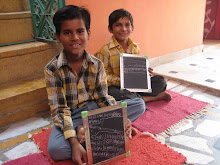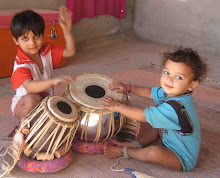I like lists, charts, and maps. This collection of little organizational passions takes a mighty step towards the back burner just about the minute I set foot inside The Merasi School. It is not that all is complete chaos and pandimonium, with students hanging from the rafters and drums flying through the air at all hours of the day. But the order and patterns here are a bit more subtle than my linear chronology would allow. And I think a lot of it can be traced back to that ever finite, but always constant resource of time.
It wasn't until I came to India that I realized I was the primary master of my time. By and large, I decide when I'm going to have a peanut butter sandwich, where I'll have it, what kind of bread to use, and who I'd like to share it with. Then I get to choose if I'll go to the bakery down the street for a cookie afterwards or head to the library to do the crossword. Implicit in each one of these decisions is an amazing privilege of choice that I didn't acknowledge until I saw (and felt just a bit) what it was like to go without.
For most of our students in The Merasi School, their time is not something they have control over. Schedules are dictated by familial needs -- if Iyeenah's father works from 7am to 8pm and her mother cannot look after her six sisters, Iyeenah's time will be spent making chai for her siblings, keeping them away from motorcyles and speedy rickshaw taxis, and scrounging together enough rice to provide an afternoon meal of some kind. Children are pulled in one direction or another depending on cultural forces: their family is called to perform at a wedding in a remote village, they need to help their overburdened mother support the family in the face of an alcoholic father, they have to spend an hour buying milk because the most direct path to the store takes them through an upper caste neighborhood where they are subject to physical and verbal violence.
So what is, say, five minutes in India? The literalist in me, which disembarks from the plane starry-eyed and hopeful would tell you it's five consecutive sixty-second chunks or the time it takes me to find all the countries beginning with 'A' on a map or the amount of time it used to take my dog Bozeman to process the command. 'Sit.' But, if you think of five minutes as a puppet, here in India at The Merasi School, this five minute puppet have about sixteen different puppeteers, from parents and siblings, to upper caste members and goverment restrictions, pulling and tugging the little figure in often contradictory directions. Kids are veritable contortionists with their time. So, when Seema tells me, "Caitie, no problem, I'll be back in five minutes," I could see her in 10 minutes or I could see her in five hours.
What we try to do at The Merasi School is instill in kids the fundamental skills to have more say over their time. If you can do basic math, you can make sure you're getting the right change when you buy milk. If you can read simple English and Hindi, you can tell if the expiration date on the milk has passed or not, preventing a store owner from getting a child to waste precious rupees on rotten products. Each one of these capacities builds up to give individuals more and more agency in the arc of an ordinary day and, incrementally, in the arc of their extraordinary lives. The cumulative impact, co-founder Sarwar Khan and I believe and hope, is that students are developing the skills to control, manage, and shape their time towards a day patterend with choice and opportunity.
This could, very well, take at least five minutes...
Subscribe to:
Post Comments (Atom)


1 comment:
i'm happy to be reading your lovely thoughts!
love, hannah
Post a Comment